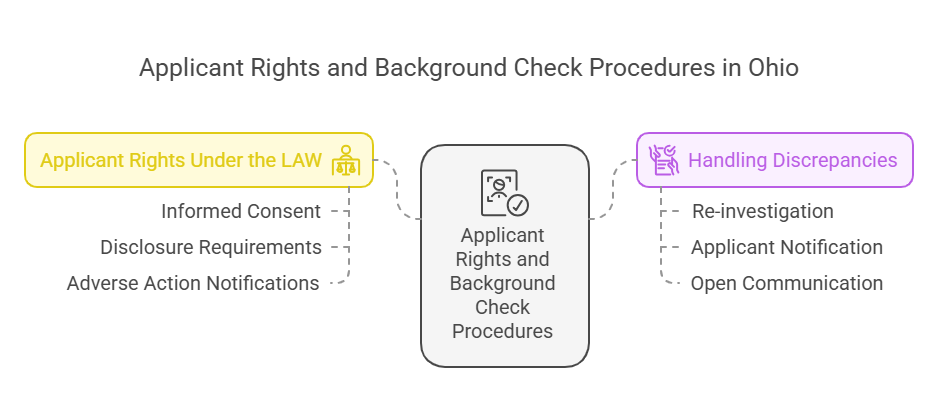Navigating the complex landscape of background check laws is crucial for employers who want to ensure compliant and effective hiring practices. In Ohio, understanding the specific legal requirements surrounding background checks can be the difference between smooth operations and potential legal challenges. Whether you're an HR professional, a business owner, or a hiring manager, this guide will arm you with all the essential information on Ohio background check laws, so you can make informed decisions.
Key Takeaways
- Background checks in Ohio are essential for informed hiring decisions and protecting business interests, with specific state laws dictating their process.
- Ohio's background check laws require employers to follow stringent protocols, including obtaining written consent and respecting limitations on certain criminal records.
- Recent updates to Ohio's hiring laws emphasize postponing criminal history inquiries and enhancing data privacy to ensure fair and transparent hiring.
- Compliance with both Ohio laws and the Fair Credit Reporting Act requires careful adherence to consent and disclosure protocols during the hiring process.
Introduction
When it comes to hiring, background checks aren't just a formality—they're essential. In Ohio, understanding these checks is critical for every employer who wants to ensure they’re bringing the right people on board. Think of background checks as a protective measure, not only screening for potential red flags but also safeguarding your business interests and workplace safety.
Ohio brings its own set of nuances to the table. Unlike some other states, Ohio’s background check requirements can be a bit more stringent in certain sectors. Knowing these local specifics helps prevent costly legal slip-ups. Each state has its way of doing things, and for Ohio employers, this means being up-to-date with both state and local regulations while keeping an eye on the federal framework. In short, getting the background check process right in Ohio isn’t just smart—it's essential for smooth, compliant hiring.
Understanding Ohio Background Check Laws
Background checks in Ohio serve as the bedrock for informed hiring decisions, providing employers with critical insights into the histories of potential hires. In essence, these checks are tools that help businesses safeguard their interests by verifying the details about applicants that are pivotal to job performance and culture fit. In Ohio, background checks aren’t merely about filtering; they are governed by a specific legal framework that ensures fairness and compliance.
Ohio’s laws dictate what information can be collected, how it can be used, and the steps companies must take if they decide to act on the information obtained. Recent legal shifts have introduced nuances to these processes, necessitating that employers remain updated with any changes to avoid compliance pitfalls. The Ohio Bureau of Criminal Identification and Investigation (BCI) plays a crucial role in this landscape as the central authority responsible for conducting background checks. It handles the processing and dissemination of criminal records, making it an integral resource for employers seeking thorough and lawful checks.
The laws in Ohio do not just protect employers; they also lay down vital protections for applicants. Requirements dictate transparency and accuracy, ensuring an individual’s rights are preserved throughout the hiring process. Understanding these foundations empowers employers to not only adhere to legal obligations but also to foster a fair and just hiring environment.
EXPERT INSIGHT: In the ever-evolving work ecosystem, HR professionals like us need to have a crystal clear understanding of the background check laws. The same thing is true for the HR professionals in Ohio. Compliance with state requirements—such as obtaining written consent and protecting personal data—is crucial for equitable hiring. By being informed and updated, employers can reduce legal risks. This can create a more inclusive environment. As we know, compliance fosters a workplace built on integrity and respect. - Charm Paz, CHRP
Compliance with Ohio Employment Screening Protocols
Compliance in Ohio requires understanding a layered set of guidelines to avoid missteps in the hiring process. Start with best practices: ensure clarity in your background check policies, make them accessible to all job applicants, and be transparent about how the information will be used. Ohio mandates that employers can only request specific types of information—criminal history, driving records, and employment history—but be mindful of what’s necessary for the job.
To navigate Ohio's legal requirements effectively, focus on key aspects. Always obtain written consent before conducting a background check, and remember, not all criminal records are fair game for employment decisions. Ohio law limits the consideration of sealed or expunged records, and employers need to respect those boundaries.
The Fair Credit Reporting Act (FCRA) also places federal guards around Ohio's state laws, ensuring that any consumer report obtained is handled lawfully. This includes giving applicants a copy of the report and a summary of their rights before taking adverse actions based on the information received. Compliance here means being meticulous with documentation and communication, which helps safeguard your organization against potential litigation.
Staying on top of these laws isn’t merely a legal obligation—it’s about crafting a fair and transparent hiring process that respects candidates while protecting the company’s interests.
Ohio Hiring Laws: What's New and What's Important
Ohio's hiring landscape has seen some recent shifts, and staying on top of these changes is vital for any business looking to stay compliant. In 2023, Ohio introduced updates to its ban-the-box laws, which affect how and when employers can inquire about an applicant's criminal background. These updates emphasize the need to focus more on an applicant's qualifications rather than their criminal history during the early stages of the hiring process. It means postponing any criminal history queries until after an initial interview, thereby promoting fair chances for all candidates.
Another significant change is the modification of privacy rules. Employers must now ensure greater transparency in how they collect, store, and use personal data obtained from background checks. This ties back to strengthening data protection efforts across the board, aligning with a broader national trend.
Key legal considerations hinge on not only adhering to these updated timelines and privacy measures but also ensuring that all hiring practices reflect the core principles of non-discrimination and fairness. Employers are advised to review these laws carefully, possibly with legal counsel, to integrate these changes smoothly into their hiring protocols. Keeping abreast of these updates will ward off hefty fines and legal challenges, maintaining a fair and equitable hiring environment.
The Application of Ohio FCRA Compliance
Understanding how Ohio’s background check laws interact with the federal Fair Credit Reporting Act (FCRA) is crucial for employers aiming to stay compliant. The FCRA sets nationwide standards for background checks conducted by consumer reporting agencies, and Ohio’s laws sit squarely on top of these requirements. Employers must ensure they adhere to both sets of regulations, making the hiring process smoother and legally sound.
Ohio businesses must first obtain written consent from applicants before proceeding with a background check, as mandated by the FCRA. This initial step is both a federal and state requirement, reinforcing the importance of clear communication with potential hires. Employers also need to provide applicants with a standalone disclosure, ensuring they understand that a background check will be conducted.
If a decision to not hire is based on the findings of a background check, Ohio employers, following FCRA regulations, must issue a pre-adverse action notice to the applicant. This notice should include a copy of the report and a summary of rights under the FCRA. Ohio’s added emphasis ensures employers handle this step diligently.
To maintain compliance, employers should routinely review their procedures. Regularly auditing consent forms, disclosure statements, and adverse action processes helps keep them aligned with both state and federal laws. For more detailed guidance on maintaining compliance, you can refer to Ensuring Compliance. Understanding the layered legal landscape ensures that the hiring process remains both efficient and lawful.
Integrating Background Check Best Practices
Navigating the intricacies of background checks requires more than just understanding the laws. It demands well-structured protocols that are both effective and compliant. To start, establish clear guidelines for what will be examined in a background check—deciding which roles require extensive checks and what specific information is pertinent. Consistency is key. Apply the same standard across similar positions to avoid discrimination claims.
Leverage technology to streamline the process. Many tools can automate and simplify screenings, reducing both time and error. Consider partnering with a reliable third-party vendor to handle background checks efficiently and accurately. These vendors not only bring expertise but also stay updated on legalities—ensuring you remain compliant. Explore resources from associations like the Professional Background Screening Association (PBSA) for insights on choosing the right partnership solutions.
Ultimately, marrying effective protocols with smart tech use ensures your hiring process is not just compliant but also a seamless part of your operations.
Ohio Background Check Resources
Here is a table of related government websites that would be useful for Ohio business owners interested in background checks:
| Website Name | URL | Description |
|---|---|---|
| Department of Job and Family Services (Ohio) | https://jfs.ohio.gov/ | Offers resources on labor laws, employment regulations, and licensing impacting background checks. |
| Department of Public Safety (Ohio) | https://www.publicsafety.ohio.gov | Provides access to criminal history records, fingerprinting services, and background check information. |
| Ohio Judicial System | https://www.supremecourt.ohio.gov | Access to court records, legal information, and public records relevant to background checks. |
| Department of Rehabilitation and Correction (Ohio) | https://drc.ohio.gov | Information on criminal records, parolees, and public safety concerns. |
| Office of the Attorney General (Ohio) | https://www.ohioattorneygeneral.gov | Offers guidance on legal matters, including consumer protection and employment law. |
| Development Services Agency (Ohio) | https://development.ohio.gov | Provides resources for business development and compliance with state regulations. |
| Department of Administrative Services - IT Services (Ohio) | https://das.ohio.gov | Information on state IT policies, data privacy, and security for handling sensitive background check data. |
| Ohio History Connection (State Archives) | https://www.ohiohistory.org | Access to public records, historical documents, and archives useful for in-depth background research. |
| Ohio General Assembly | https://www.legislature.ohio.gov | Stay updated on laws and regulations passed by the state legislature that may affect background checks. |
| Department of Health (Ohio) | https://odh.ohio.gov | Information on health regulations, requirements for employee screenings, and background checks in healthcare settings. |
For Ohio business owners, having the appropriate resources at their disposal is essential. This is to guarantee the comprehensiveness and compliance of their background check procedures. The aforementioned websites offer helpful resources and direction. Employers can lower legal risks, make well-informed decisions, and promote an equitable and open hiring process by utilizing these resources. You can handle the intricacies of background checks with assurance and honesty if you keep yourself informed and consult these official resources.
Legal Considerations and Rights of Applicants
Applicant Rights Under the LAW
In Ohio, job applicants have specific rights when it comes to background checks, which employers must respect to maintain transparency and fairness in the hiring process. First and foremost, candidates need to be informed if a background check will be conducted. This includes getting explicit consent before proceeding with any checks that might influence employment decisions. If a third-party agency is involved, the Fair Credit Reporting Act (FCRA) also mandates disclosure, ensuring applicants are aware of the purpose behind the screening.
Moreover, if the results play a role in any adverse decision—like rescinding a job offer—applicants have the right to be informed, provided with a copy of the report, and given a reasonable chance to dispute any inaccuracies. This transparency fosters trust and honesty both ways, granting candidates an opportunity to clarify potential misunderstandings about their background. For more detailed insights into consumer protection and applicant rights, the FTC offers valuable information.
Handling Discrepancies
When discrepancies arise in background check results, careful handling is crucial to prevent unjust biases or misunderstandings. Employers should establish a clear procedure for managing these situations, starting with re-investigating the report to verify accuracy. Applicants should be notified promptly about the findings and given the opportunity to present their side or any relevant documentation that could help rectify mistakes.
Open communication and cooperation are key here. It helps not only in addressing errors but also in maintaining respectful and constructive relationships. By following these spartan, straightforward steps, employers can mitigate risks of legal challenges and foster a fair hiring process.

Frequently Asked Questions
How do Ohio background check laws differ from other states?
Ohio background check laws have their own nuances compared to other states. For instance, Ohio doesn't have a "ban the box" law at the state level, meaning there are no statewide restrictions preventing employers from asking about criminal history on job applications. However, some cities, like Cincinnati and Cleveland, have their own "ban the box" ordinances. It's crucial for employers to be aware of these local distinctions.
What are common pitfalls to avoid in Ohio employment screening?
Employers often stumble by not keeping pace with changes in both state and federal law. Another frequent error is failing to obtain proper consent from applicants for background checks, which can lead to legal challenges. Ignoring municipal laws like local "ban the box" rules is another common pitfall. Ensuring alignment with the Fair Credit Reporting Act (FCRA) is also critical.
How long does it take to process a background check in Ohio?
The timeline for a background check in Ohio varies. If you're relying on the Ohio Bureau of Criminal Identification and Investigation (BCI), it typically takes a few days to a week, depending on the type of check and workload. Working with third-party vendors might offer more rapid results, but they still need time to do a thorough job. It's wise to factor in possible delays and plan accordingly in the hiring process.
Conclusion
In the ever-evolving landscape of employment law, staying informed about Ohio's background check regulations is not just prudent—it's necessary. This guide has navigated the intricate and specific contours of Ohio’s legislative requirements, giving you the essential tools to make sound hiring decisions. Employers need to adapt and remain vigilant about these regulations to avoid legal pitfalls and to uphold fair hiring standards. Continue to invest in understanding these laws and regularly update your policies as changes emerge. For further guidance, explore resources such as the EEOC's background check guidelines and SHRM's comprehensive HR insights. Staying educated isn’t just about compliance; it's about fostering a transparent and trustworthy hiring process.

GCheck Editorial Team
Meet the GCheck Editorial Team, your trusted source for insightful and up-to-date information in the world of employment background checks. Committed to delivering the latest trends, best practices, and industry insights, our team is dedicated to keeping you informed.
With a passion for ensuring accuracy, compliance, and efficiency in background screening, we are your go-to experts in the field. Stay tuned for our comprehensive articles, guides, and analysis, designed to empower businesses and individuals with the knowledge they need to make informed decisions.
At GCheck, we're here to guide you through the complexities of background checks, every step of the way.






